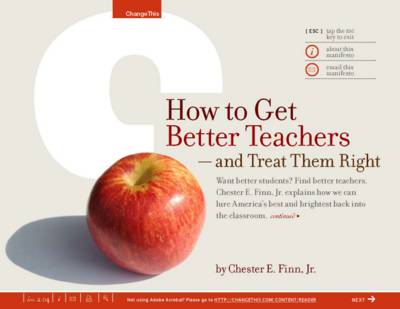Au cours d'une ballade sur le Net, un titre attire mon attention : How to Get Better Teachers and Treat Them Right.
J'ai volontairement quitté le milieu de l'enseignement il y a plusieurs années, mais le prof ne m'a pas quitté. Tout ce qui s'y passe m'intéresse donc encore au plus point, mais aussi ce qu'on en dit autour et ce qu'on en décide pour lui en hauts lieux. C'est la rentrée, les stratégies de négociation des conventions collectives commencent à poindre, l'idée d'un ordre professionnel pour les enseignants est dans l'air, on se questionne sur la qualité de la formation des maîtres et on réfléchit officiellement sur l'avenir du collégial...
La thèse de Chester E. Finn mérite qu'on s'y arrête même si elle vise au premier chef l'école américaine.
American teachers do not get the respect, the freedom, the compensation, or the rewards that many of them deserve. At the same time, U.S. schools are not producing satisfactory results, a problem that is not likely to be solved until our classrooms are filled with excellent teachers. The key to well-educated children and strong schools is a top-notch teaching staff.
Il ne croit pas que les programmes de formation à l'enseignement aient fait leurs preuves comme moyen de préparer de bons profs et encore moins d'attirer les meilleurs candidats dans le métier.
Two main objections are commonly voiced: first, that the content of these preparation sequences and certification requirements is banal and pointless stuff beloved of educationists but not very valuable to actual school practitioners; that it's minimally linked to subject matter mastery; and --most research indicates--that it can muster scant evidence of a relationship to classroom effectiveness. The second complaint is that this training-and-certification cycle is so burdensome --and full of "Mickey Mouse" courses and requirements-- that it discourages able would-be teachers from making their way into the public schools.
Quant à la pratique actuelle de l'enseignement, il la trouve dépassée et bureaucratique. Enfin et surtout, selon lui, les vrais pédagogues ne sont pas reconnus par le mode de rémunération en vigueur.
On top of that, the expert teachers themselves get no tangible rewards; they're paid exactly the same as ordinary (and weak) instructors. Longevity and paper credentials bring more money, but effectiveness does not.
"Want better students? Find better teachers."
Alors quoi? Quelle solution propose-t-il? Il propose de 'libéraliser' l'enseignement, d'offrir la possibilité d'enseigner à toute personne compétente intéressée et de l'évaluer selon un seul critère : ce que les élèves ont appris dans sa classe.
Instead of using degrees earned, standards met, or the opinions of other teachers as indicators of quality, we should evaluate teachers based on the only measure that really matters: whether their pupils are learning. Although good teachers do many other worthwhile things besides add to student learning -- they help other teachers, serve as moral role models, work with parents, and so on -- nothing they do is as important as academic achievement. The more of it they produce, the greater will be society's admiration for them and the more open-handed will be the attitude of policymakers and taxpayers regarding their compensation.
Gauging the student learning that individual teachers produce is no pipe dream. Careful statistical analysis can identify with precision the gains that students make during a school year and then estimate the effects of individual teachers on their progress. Judging teachers by the results they produce is the core of the commonsense strategy. The rest is straightforward: states should allow individual public schools to employ teachers as they see fit and then hold those schools accountable for their results.
Il croit enfin que tant que les profs médiocres seront aussi bien rémunérés que les meilleurs, la qualité du personnel ne pourra pas s'améliorer. Or, 'les bons profs font les bons élèves'.
That means flexible pay, too. Common sense argues that teachers of subjects in short supply should be paid more than those in overstocked fields, that teachers working in hard-to-staff schools should earn more than those in schools with
hundreds of applicants, and that outstanding teachers should be paid more than mediocre ones.
En conclusion, Finn prône la professionnalisation de l'enseignement. Il faut arrêter de penser qu'on peut faire de bons profs avec de mauvais candidats même avec plusieurs années de formation. Il faut plutôt attirer les meilleurs candidats et leur offrir un statut professionnel.
For too long, policymakers have tackled the teacher quality problem by tightening regulations and expanding pedagogical requirements, even though this approach shrinks the pool of candidates while having scant effect on their quality. Forty years of experience suggest that this strategy has not worked. It probably cannot work. It's reminiscent of the heavy drinker who proposes to cure his hangover by imbibing more of the strong spirits that gave him the headache in the first place.
As with the alcoholic, a "hair of the dog that bit you" approach to teacher quality
reform can be counted on to make the problem worse. Indeed, it has already compounded today's dual crisis of quality and quantity and weakened the impulse to turn teaching into a true profession. True professions, after all, don't hide behind government regulations, tenure laws, and uniform pay scales.

Aucun commentaire:
Publier un commentaire